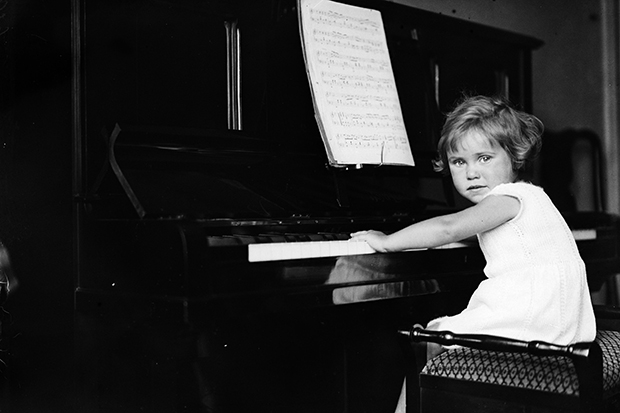Aldous Huxley observed that ‘Where music is concerned, infant prodigies are almost the rule. In the world of literature, on the other hand, they remain the rarest exceptions.’ This, he believed, was because good literature could not be written without experience of the outside world, while music was the art least connected with reality. ‘Like mathematics,’ he said, ‘it is an almost unadulterated product of the inner world.’
Musicians may dispute the last point, but the fact remains that musical and artistic ability can emerge with dizzying speed. When it does, the question is how best — and how far — to nurture it? Several schools offer a specialised education in music, dance and drama alongside an academic curriculum, letting talented pupils devote time to their creative interests without missing out on a core education. As well as choir schools, there are dedicated music schools such as the Purcell School in London for nine-to-18 year-olds and the Yehudi Menuhin in Surrey offering tailored tuition for musically gifted children aged seven to 18. Dance and drama are the focus at Arts Ed in London, while the Brit School in Croydon and Tring Park near Aylesbury combine vocational with traditional subjects.
Lord Menuhin, a prodigy himself, believed it was important for creative children to have the best teachers from the earliest possible age. As Dr Richard Hillier, headmaster of Yehudi Menuhin, acknowledges, however, it is quite common for a child of seven or eight to have very many passions. Tempting as it is to nurture talent while the brain is still young and malleable, it can be difficult to determine which hobbies will endure. He suggests observing your child closely to gauge the depth of their interests. If your daughter likes Brownies, horse-riding, dance, drama and violin, which is top of her list? If it is violin, does she like performing? Most importantly, does she practise without being told to do so?
Today it is more common to wait until a child is approaching their teens before narrowing their focus. ‘If we see a boy or girl aged seven or eight who is clearly musical, enjoys performing, and has been set on the right path by a sound teacher, then we are delighted,’ says Dr Hillier. ‘However, most children join us between the ages of 11 and 14.’
At this stage children can know themselves whether a specialised education will be right for them.
Award-winning violinist Juliette Roos, a recent alumna of Yehudi Menuhin, joined at the age of 13. ‘After an audition I was invited to stay at the school for three days. In these three days I realised that the school was a place I very much wanted to be a part of. It was an intense environment, but everyone had the same passion for music as I did.’
Although they offer excellent support, first-class teaching and rich opportunities, specialist arts schools are far from a ‘soft’ option, and pupils often face more examinations than their peers. Students at Arts Ed in London, for instance, take a range of dance and drama exams, including the prestigious Lamda qualifications, alongside GCSEs and A-levels. At the Brit School, a state-funded college for 14- to 19-year-olds, pupils sit a BTec diploma, equivalent to three A-levels.
While many pupils relish being immersed in the arts, others may find the academic curricula in some arts schools too limiting. While most offer the opportunity to sit at least seven GCSEs and two A-levels or a BTec, the range of subjects tends to be smaller than in other independent schools. Science sometimes receives less emphasis than other courses – some schools offer no sciences at A-level at all.
An arts education — and all the paraphernalia that goes with it — can be expensive, so it’s worth asking about bursaries. Arts Ed offers full scholarships in particular cases, and the Brit School is free. Yehudi Menuhin and Tring Park are among schools that benefit from the Department for Education’s Music and Dance Scheme, which provides means-tested bursaries for talented pupils. The others are Chetham’s School in Manchester, Hammond School in Chester, The Purcell School, The Royal Ballet School, Wells Cathedral School, and Elmhurst School in Birmingham.
They may well be intense, but if the prospect of your child joining that ‘small army of marvellous’ children which Aldous Huxley praised is appealing, then a specialist arts school may well be the best place to start.






Comments